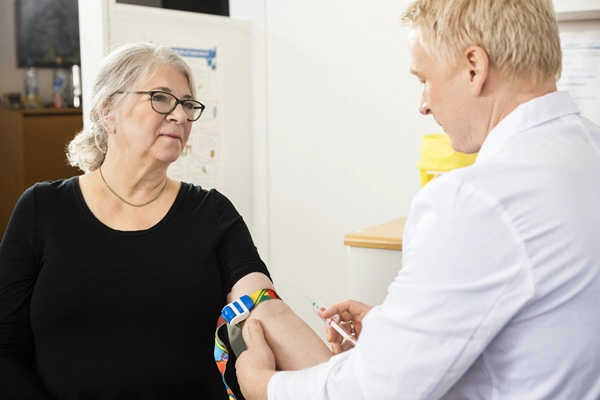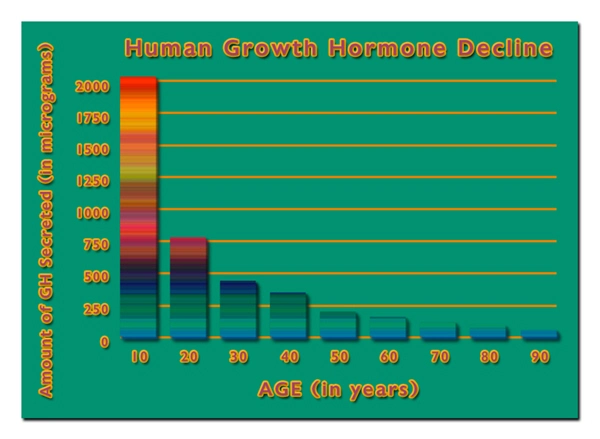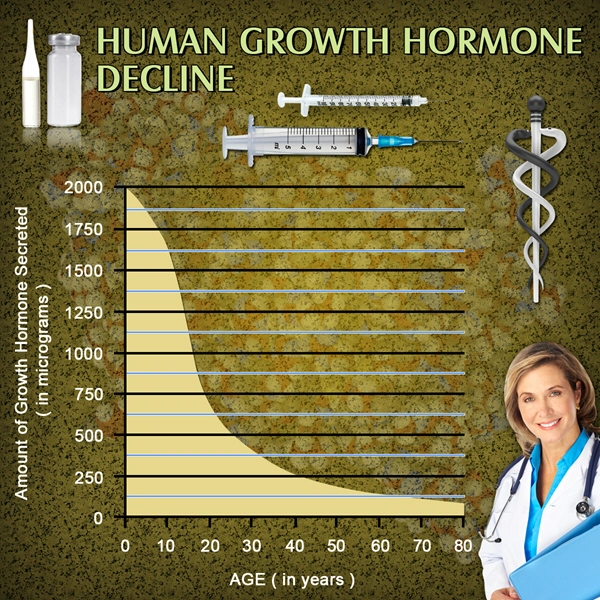Introduction
Primary hypogonadism, characterized by the failure of the testes to produce adequate levels of testosterone, has been increasingly recognized as a significant health concern among American males. This condition not only affects reproductive and sexual health but may also have broader implications on overall physical well-being, including joint health and the risk of developing arthritis. A recent retrospective study, which analyzed data from over 10,000 patients, sheds light on the relationship between primary hypogonadism and musculoskeletal health, offering crucial insights for both patients and healthcare providers.
Understanding Primary Hypogonadism
Primary hypogonadism, also known as hypergonadotropic hypogonadism, is a condition where the gonads (testes in males) do not function properly due to intrinsic defects. This leads to low testosterone levels and high levels of gonadotropins (LH and FSH). Symptoms can include decreased libido, erectile dysfunction, infertility, and reduced muscle mass. While the condition's impact on sexual and reproductive health is well-documented, its effects on other systems, such as the musculoskeletal system, are less understood but increasingly important.
Study Methodology and Findings
The retrospective study involved analyzing medical records from over 10,000 American males diagnosed with primary hypogonadism. Researchers compared these patients with a control group of males without the condition, focusing on joint health and arthritis incidence. The study revealed a statistically significant increase in the prevalence of joint pain and arthritis among males with primary hypogonadism. Specifically, patients with this condition were 30% more likely to report joint pain and 25% more likely to be diagnosed with arthritis compared to the control group.
The Link Between Testosterone and Joint Health
Testosterone plays a crucial role in maintaining bone density and muscle mass, both of which are essential for joint health. Low levels of testosterone, as seen in primary hypogonadism, can lead to reduced bone density (osteopenia or osteoporosis) and muscle atrophy, which in turn can increase the stress on joints and contribute to the development of arthritis. The study's findings support the hypothesis that testosterone deficiency may be a risk factor for joint-related issues.
Clinical Implications and Management
The findings from this study have significant implications for the clinical management of primary hypogonadism. Healthcare providers should consider screening for joint health issues in patients diagnosed with this condition. Early detection and intervention, such as testosterone replacement therapy, may help mitigate the risk of developing arthritis and improve overall quality of life. Additionally, lifestyle modifications, including regular exercise and a balanced diet, can support joint health and overall well-being.
Future Research Directions
While this study provides valuable insights into the relationship between primary hypogonadism and joint health, further research is needed to fully understand the mechanisms involved and to develop targeted interventions. Longitudinal studies could help determine the long-term effects of testosterone replacement therapy on joint health and arthritis risk. Additionally, exploring the genetic and environmental factors that may influence this relationship could provide a more comprehensive understanding of the condition.
Conclusion
The retrospective study of over 10,000 American males with primary hypogonadism highlights a significant association between this condition and increased risks of joint pain and arthritis. These findings underscore the importance of considering the broader health implications of primary hypogonadism beyond its well-known effects on sexual and reproductive health. By integrating joint health assessments into the management of primary hypogonadism, healthcare providers can offer more holistic care and potentially improve outcomes for their patients. As research continues to evolve, it will be crucial to stay informed about new developments and incorporate them into clinical practice to enhance the quality of life for American males affected by this condition.

- Primary Hypogonadism: Overcoming Stigma and Enhancing Men's Health in America [Last Updated On: February 22nd, 2025] [Originally Added On: February 22nd, 2025]
- Exercise Regimen Boosts Testosterone in American Males with Primary Hypogonadism [Last Updated On: March 17th, 2025] [Originally Added On: March 17th, 2025]
- Primary Hypogonadism in Aging American Men: Symptoms, Impacts, and Management Strategies [Last Updated On: March 17th, 2025] [Originally Added On: March 17th, 2025]
- Innovative Therapies and Lifestyle Interventions for Primary Hypogonadism in American Males [Last Updated On: March 19th, 2025] [Originally Added On: March 19th, 2025]
- Primary Hypogonadism: Symptoms, Diagnosis, and Treatment Options for American Men [Last Updated On: March 19th, 2025] [Originally Added On: March 19th, 2025]
- Primary Hypogonadism: Understanding, Managing, and Supporting Affected American Men [Last Updated On: March 19th, 2025] [Originally Added On: March 19th, 2025]
- Primary Hypogonadism: Impact on Work and Strategies for American Men's Productivity [Last Updated On: March 20th, 2025] [Originally Added On: March 20th, 2025]
- Emotional Journey of American Males with Primary Hypogonadism: From Diagnosis to Acceptance [Last Updated On: March 20th, 2025] [Originally Added On: March 20th, 2025]
- Managing Primary Hypogonadism: Diet, Nutrition, and Lifestyle Strategies for American Males [Last Updated On: March 20th, 2025] [Originally Added On: March 20th, 2025]
- Primary Hypogonadism and Obesity Link in American Males: Causes, Impacts, and Management [Last Updated On: March 21st, 2025] [Originally Added On: March 21st, 2025]
- Primary Hypogonadism in American Men: Support Networks and Psychological Impact [Last Updated On: March 21st, 2025] [Originally Added On: March 21st, 2025]
- Primary Hypogonadism and Diabetes: Dual Health Challenge for American Men [Last Updated On: March 22nd, 2025] [Originally Added On: March 22nd, 2025]
- Managing Primary Hypogonadism: Navigating Diagnosis, Treatment, and Support in the US [Last Updated On: March 22nd, 2025] [Originally Added On: March 22nd, 2025]
- Diagnosing Primary Hypogonadism in American Males: Challenges and Advances [Last Updated On: March 23rd, 2025] [Originally Added On: March 23rd, 2025]
- Managing Primary Hypogonadism: Symptoms, Diagnosis, and Treatment Options for American Men [Last Updated On: March 23rd, 2025] [Originally Added On: March 23rd, 2025]
- Managing Primary Hypogonadism: Education and Treatment for American Males [Last Updated On: March 23rd, 2025] [Originally Added On: March 23rd, 2025]
- Primary Hypogonadism: Understanding Emotional Impact and Holistic Management Strategies [Last Updated On: March 23rd, 2025] [Originally Added On: March 23rd, 2025]
- Primary Hypogonadism's Impact on Muscle Mass in American Males: Causes and Therapies [Last Updated On: March 24th, 2025] [Originally Added On: March 24th, 2025]
- American Males' Resilience in Managing Primary Hypogonadism: Stories and Strategies [Last Updated On: March 24th, 2025] [Originally Added On: March 24th, 2025]
- Primary Hypogonadism: Mental Health's Crucial Role in Holistic Care for American Men [Last Updated On: March 24th, 2025] [Originally Added On: March 24th, 2025]
- Innovative Therapies and Personalized Approaches Transforming Primary Hypogonadism Treatment in American Males [Last Updated On: March 24th, 2025] [Originally Added On: March 24th, 2025]
- Community Support Enhances Management of Primary Hypogonadism in American Men [Last Updated On: March 25th, 2025] [Originally Added On: March 25th, 2025]
- Primary Hypogonadism in American Men: TRT's Role and Holistic Management [Last Updated On: March 25th, 2025] [Originally Added On: March 25th, 2025]
- Primary Hypogonadism in American Men: Symptoms, Causes, and Holistic Management [Last Updated On: March 25th, 2025] [Originally Added On: March 25th, 2025]
- Genetic Testing for Primary Hypogonadism: Diagnosis and Management in American Males [Last Updated On: March 25th, 2025] [Originally Added On: March 25th, 2025]
- Primary Hypogonadism's Impact on Sleep: Diagnosis, Treatment, and Lifestyle Management [Last Updated On: March 25th, 2025] [Originally Added On: March 25th, 2025]
- Managing Primary Hypogonadism: Symptoms, Diagnosis, and Healthcare Navigation in the US [Last Updated On: March 25th, 2025] [Originally Added On: March 25th, 2025]
- Primary Hypogonadism: Impact, Advocacy, and Research Needs for American Men [Last Updated On: March 25th, 2025] [Originally Added On: March 25th, 2025]
- Primary Hypogonadism: Impact on Body Image and Management Strategies for American Men [Last Updated On: March 25th, 2025] [Originally Added On: March 25th, 2025]
- Primary Hypogonadism: Family Support's Crucial Role in American Males' Well-being [Last Updated On: March 25th, 2025] [Originally Added On: March 25th, 2025]
- Primary Hypogonadism: Causes, Symptoms, and Early Intervention for American Men [Last Updated On: March 25th, 2025] [Originally Added On: March 25th, 2025]
- Primary Hypogonadism Management: Importance of Regular Check-ups for American Males [Last Updated On: March 25th, 2025] [Originally Added On: March 25th, 2025]
- Financial Burdens of Primary Hypogonadism: Costs, Insurance, and Coping Strategies for American Men [Last Updated On: March 25th, 2025] [Originally Added On: March 25th, 2025]
- Primary Hypogonadism in American Males: Diagnosis, Treatment, and Management Strategies [Last Updated On: March 25th, 2025] [Originally Added On: March 25th, 2025]
- Primary Hypogonadism: Causes, Symptoms, and Treatment in American Men [Last Updated On: March 26th, 2025] [Originally Added On: March 26th, 2025]
- Primary Hypogonadism: Diagnosis, Specialists, and Management for American Men [Last Updated On: March 26th, 2025] [Originally Added On: March 26th, 2025]
- Primary Hypogonadism: Impacts on American Men's Social Life and Health [Last Updated On: March 26th, 2025] [Originally Added On: March 26th, 2025]
- Primary Hypogonadism in American Men: Diagnosis, Impact, and Management Strategies [Last Updated On: March 27th, 2025] [Originally Added On: March 27th, 2025]
- Nutritionists' Vital Role in Managing Primary Hypogonadism in American Males [Last Updated On: March 27th, 2025] [Originally Added On: March 27th, 2025]
- Exercise Physiologists' Role in Managing Primary Hypogonadism in American Males [Last Updated On: March 27th, 2025] [Originally Added On: March 27th, 2025]
- Understanding Primary Hypogonadism: Symptoms, Diagnosis, and Treatment Options [Last Updated On: March 27th, 2025] [Originally Added On: March 27th, 2025]
- Primary Hypogonadism: Impacts, Diagnosis, and Management in American Males [Last Updated On: March 27th, 2025] [Originally Added On: March 27th, 2025]
- Primary Hypogonadism: Impacts and Strategies for Career Success in American Males [Last Updated On: March 27th, 2025] [Originally Added On: March 27th, 2025]
- Primary Hypogonadism's Impact on Physical Activity in American Males: Challenges and Strategies [Last Updated On: March 27th, 2025] [Originally Added On: March 27th, 2025]
- Primary Hypogonadism in American Men: The Vital Role of Peer Support [Last Updated On: March 27th, 2025] [Originally Added On: March 27th, 2025]
- Primary Hypogonadism: Variability in Symptoms and Impact on American Men's Health [Last Updated On: March 28th, 2025] [Originally Added On: March 28th, 2025]
- Primary Hypogonadism in American Men: Diagnosis, Treatment, and Management Strategies [Last Updated On: March 28th, 2025] [Originally Added On: March 28th, 2025]
- Primary Hypogonadism's Impact on Self-Esteem in American Males: A Holistic Approach [Last Updated On: March 29th, 2025] [Originally Added On: March 29th, 2025]
- Primary Hypogonadism: Understanding Treatments and Managing Side Effects in American Males [Last Updated On: March 29th, 2025] [Originally Added On: March 29th, 2025]
- Primary Hypogonadism: Addressing Emotional Challenges in American Men [Last Updated On: March 30th, 2025] [Originally Added On: March 30th, 2025]
- Primary Hypogonadism: Impact, Monitoring, and Management Strategies for American Men [Last Updated On: March 30th, 2025] [Originally Added On: March 30th, 2025]
- Primary Hypogonadism: Impacts and Options for Family Planning in American Males [Last Updated On: April 1st, 2025] [Originally Added On: April 1st, 2025]
- Primary Hypogonadism: Managing Stress and Anxiety in American Men [Last Updated On: April 2nd, 2025] [Originally Added On: April 2nd, 2025]
- Primary Hypogonadism in American Men: Diagnosis, Treatment, and Lifestyle Management [Last Updated On: April 4th, 2025] [Originally Added On: April 4th, 2025]
- Overcoming Psychological Barriers to Treating Primary Hypogonadism in American Men [Last Updated On: April 4th, 2025] [Originally Added On: April 4th, 2025]
- Endocrinologists' Vital Role in Managing Primary Hypogonadism in American Males [Last Updated On: April 5th, 2025] [Originally Added On: April 5th, 2025]
- Managing Primary Hypogonadism: Financial Strategies and Support Options for American Men [Last Updated On: April 6th, 2025] [Originally Added On: April 6th, 2025]
- Revolutionizing Primary Hypogonadism Management with Wearable Tech and Telemedicine in American Men [Last Updated On: April 7th, 2025] [Originally Added On: April 7th, 2025]
- Managing Primary Hypogonadism: Diagnosis, Treatment, and Lifestyle Strategies for American Men [Last Updated On: April 8th, 2025] [Originally Added On: April 8th, 2025]
- Primary Hypogonadism: Impacts on Social Life and Relationships in American Males [Last Updated On: April 8th, 2025] [Originally Added On: April 8th, 2025]
- Primary Hypogonadism: Impacts on Health, Psychology, and Daily Life in American Males [Last Updated On: April 9th, 2025] [Originally Added On: April 9th, 2025]
- Primary Hypogonadism: Challenges and Strategies for Treatment Adherence in American Males [Last Updated On: April 9th, 2025] [Originally Added On: April 9th, 2025]
- Primary Hypogonadism: Educating American Males on Symptoms, Treatment, and Lifestyle Management [Last Updated On: April 10th, 2025] [Originally Added On: April 10th, 2025]
- Support Groups: Vital for Managing Primary Hypogonadism in American Males [Last Updated On: April 10th, 2025] [Originally Added On: April 10th, 2025]
- Primary Hypogonadism: A Multidisciplinary Approach for American Men's Health [Last Updated On: April 10th, 2025] [Originally Added On: April 10th, 2025]
- Managing Primary Hypogonadism: Diagnosis, Treatment, and Maintaining a Positive Outlook for American Men [Last Updated On: April 11th, 2025] [Originally Added On: April 11th, 2025]
- Mental Health Apps: A New Hope for American Males with Primary Hypogonadism [Last Updated On: April 12th, 2025] [Originally Added On: April 12th, 2025]
- Primary Hypogonadism: Understanding, Treatments, and Future Hope for American Men [Last Updated On: April 14th, 2025] [Originally Added On: April 14th, 2025]
- Managing Primary Hypogonadism: Importance of Regular Follow-ups for American Men [Last Updated On: April 15th, 2025] [Originally Added On: April 15th, 2025]
- Primary Hypogonadism Management: Multidisciplinary Team Approach for American Men [Last Updated On: April 15th, 2025] [Originally Added On: April 15th, 2025]
- Primary Hypogonadism: Navigating Workplace Challenges and Advocacy for American Men [Last Updated On: April 16th, 2025] [Originally Added On: April 16th, 2025]
- Physical Therapy's Role in Managing Primary Hypogonadism in American Males [Last Updated On: April 18th, 2025] [Originally Added On: April 18th, 2025]
- Dietitians' Role in Managing Primary Hypogonadism Through Tailored Nutrition Plans [Last Updated On: April 18th, 2025] [Originally Added On: April 18th, 2025]
- Primary Hypogonadism: Navigating Travel Challenges for American Males [Last Updated On: April 18th, 2025] [Originally Added On: April 18th, 2025]
- Primary Hypogonadism's Impact on Cognitive Function and Academic Success in American Males [Last Updated On: April 18th, 2025] [Originally Added On: April 18th, 2025]
- Preparing for Primary Hypogonadism Diagnosis: A Guide for American Men [Last Updated On: April 19th, 2025] [Originally Added On: April 19th, 2025]
- Primary Hypogonadism's Impact on American Men's Hobbies and Social Life [Last Updated On: April 19th, 2025] [Originally Added On: April 19th, 2025]
- Primary Hypogonadism in American Men: Diagnosis, Treatment, and Lifestyle Impact [Last Updated On: April 19th, 2025] [Originally Added On: April 19th, 2025]
- Five-Year Study Confirms Efficacy and Safety of HRT for Primary Hypogonadism in American Men [Last Updated On: April 22nd, 2025] [Originally Added On: April 22nd, 2025]
- Managing Primary Hypogonadism: Exercise Benefits for American Men's Health [Last Updated On: April 22nd, 2025] [Originally Added On: April 22nd, 2025]



List of USA state clinics - click a flag below for blood testing clinics.
Word Count: 585


















































